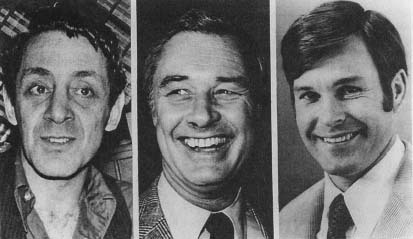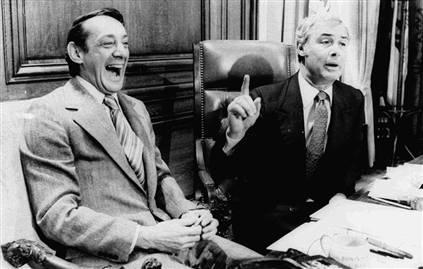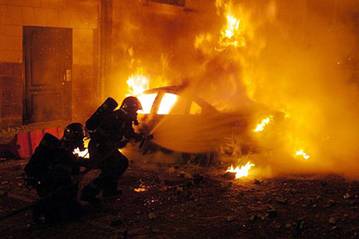by Cindi Ernst

HARVEY MILK BIOGRAPHY:
American politician and civil rights activist
Born: May 22, 1930, Woodmere, New York
Died: November 27, 1978, San Francisco, California
San Francisco city politician Harvey Milk helped open the door for gays and lesbians in the United States by championing civil rights for homosexuals. Since Milk's murder in 1978, he has remained a symbol of activism.
In 1947 Milk entered New York State College for Teachers in Albany, New York. After earning his degree in 1951, Milk joined the Navy. He served as a chief petty officer on a submarine rescue ship during the Korean War (1950–53), in which American forces aided the South Korean fight against North Korea. Eventually he reached the rank of junior lieutenant before his honorable discharge in 1955.
In spite of his lifestyle, Milk's political and social values were conservative through the early 1960’s. As the decade progressed, however, his views gradually began to change. Milk's new lover, Jack Galen McKinley, worked in theater, and through him Milk became involved as well. In 1968 when McKinley was hired as a stage director for O’Horgan’s San Francisco production of the musical Hair, Milk decided to move with him to San Francisco.
POLITICAL OFFICE: When the Watergate scandal took place in 1973, Milk was angered by the political cover-ups and decided to enter into the political arena hoping to produce change. His first attempt running for a spot on the San Francisco Board of Supervisors was met with defeat. This said, he did however become popular in his own largely gay district and became known as “the Mayor of Castro Street”. On Milk’s third try, he was finally elected to the Board of Supervisors, becoming the first openly gay elected official in the city’s history.
He was instrumental in starting programs that benefited minorities and the elderly. The city at his urging began a drive to hire more gay and lesbian police officers. Milk also gained national attention for his role in defeating a state senate proposal that would have prohibited gays and lesbians from teaching in public schools in California.
A LIFE CUT SHORT: On November 27, 1978, Milk and Mayor Moscone were shot to death in City Hall by Dan White, a former city supervisor who had quit the board to protest the passage of the city's gay rights law. In his trial for the killings, White's attorneys employed what came to be known as the “Twinkie Defense”.
GEORGE MOSCONE:
Mayor of San Francisco
George Moscone was born to working class parents. His parents divorced when he was eight at which time George lived with his mother. Moscone with the support of his mom and the Catholic Church became an outstanding citizen who attended the University of the Pacific on a basketball scholarship. He then went on to graduate from Hastings School of Law. After law school he married his childhood friend Gina Bodanza and had four children. They were still married at the time of his death.
POLITICS: Moscone at the urging of John Burton, the brother of state assemblyman Phillip Burton, entered into the arena of politics. He went on to become a County Supervisor, state Senator and Mayor of San Francisco. Moscone’s upbringing in a working class neighborhood was instrumental in his endeavors to stand up for the working class and minorities.
GAY RIGHTS LEGISLATION: As a Senator, Monscone was responsible for a California Gay Rights’ Bill. This bill prohibited discrimination, or unequal treatment in the area of housing and employment based on sexual orientation. The bill was signed in April of 1977 in the mayor’s office. Moscone was not always supported by the San Francisco Board of Supervisors as he continually sought their support on various matters.

DAN WHITE:
Former policeman, fireman, and member of San Francisco Board of Supervisors
On November 10, 1978, Dan White a former police and firefighter resigned his position on the San Francisco Board of Supervisors, claiming that his annual salary of $9,600 was not enough to support his family. November 27, 1978 a half hour before the press conference to announce Dan’s replacement, horrific events began to unfold. Dan White entered City Hall through a basement window to avoid the metal detectors in the building and fatally shot Mayor Monscone. He continued down the hall looking for his next target and fatally shot Harvey Milk, the first openly gay man to be elected to an official position in the United States. Milk was serving as a member on the San Francisco Board of Supervisors.
Few could have envied Douglas Schmidt's, White’s Counsel’s task when he rose to make the opening statement on White's behalf; after all, he was representing an admitted double assassin. However, he soon went on the offensive. In an impressionable speech he skillfully diverted the jury's attention away from the crime itself and onto the emotional traumas that White had undergone since relinquishing his position as city supervisor. "Good people, fine people, with fine backgrounds, simply don't kill people in cold blood," said Schmidt, "it just doesn't happen, and obviously some part of him has not been presented thus far." Schmidt claimed that White's crimes had been the product of manic depression, "a vile biochemical change" over which the defendant had no control. As added insurance, just in case this line of reasoning failed to sway the jury, Schmidt rounded out his opening with some very pointed comparisons between Milk's overtly homosexual lifestyle and White's all-American background.
DEFENSE: “The Twinkie Defense” as it became known, is synonymous with the trial of Dan White. White’s legal team took the position that Dan was suffering from a long-standing and untreated depression that diminished his capacity to distinguish right from wrong. Expert testimony by psychiatrist Dr. Martin Blinder noted White had changed his normally health conscious diet to a diet that consisted of junk food. Dr. Blinder pointed out that this change in diet was evidence of White’s depression, not a cause of it. This state of depression was used to establish grounds for a successful diminished capacity plea convicting White of the lesser charge of voluntary manslaughter.
“I don’t think Twinkies were ever mentioned in testimony,” said chief defense attorney Douglas Schmidt, who recalls “Ho Ho’s and Ding Dongs, but no Twinkies." The main focus of the defense’s case was diminished capacity- that White had suffered from periodic bouts of depression, amounting to “a mental illness.” That, along with “the machinations of dirty politics at City Hall," White’s co-counsel Stephen Scherr said in a recent interview, “drove him ‘round the bend.”
CONVICTION: On May 21, 1979, the jury returned two verdicts of voluntary manslaughter. Judge Walter Calcagno gave White the maximum sentence, seven years, and eight month’s imprisonment. With good behavior he could be a free man in five years. White was released from prison January 6, 1984, after serving five years, one month and nine days.
A SUICIDE: Dan White was found in a car in the garage of a house owned by his wife in San Francisco’s middle-class Excelsior district. His brother found his body around 2 P.M. A rubber hose had been used to pipe lethal carbon monoxide into the car. White was 39 years old.
CHANGE IN CALIFORNIA LAW: After the jury convicted White of voluntary manslaughter -- the least serious charge for homicide. This caused uproar against the diminished capacity plea in California, and in 1982, voters overwhelmingly approved a proposition to eliminate the defense.
See: 1981 CAL. STAT. ch. 404, effective January 1, 1982.
See: 1982 CAL. STAT. ch. 893, effective January 1, 1983.
THE FEDERAL RULE OF DIMINISHED CAPACITY-SENTENCING:
The United States Sentencing Guidelines (USSG) sets minimum sentencing for certain federal crimes, and also sets the guidelines by which judges may stray from these minimums. The U.S.S.G. states that a federal court may depart downward from the minimum sentence on the basis of diminished capacity if the offense was nonviolent. U.S.S.G. § 5K2.13. See also United States v. Cook, 53 F.3d 1029 (9th Cir. 1994).
FULL TEXT OF COUT DECISIONS: California v. White, 117 Cal.App 3d 270 (1981)
After going to the URL above, obtain the “Opinion” by using the citation given.
WHITE NIGHT RIOT: The public, particularly the San Francisco gay community was outraged by the voluntary manslaughter conviction. Reaction to the conviction resulted in the White Night Riot on the evening of White’s conviction May 21, 1979.
Uncle Donald’s Castro Street-White Night Riot:

“MILK”-THE MOVIE: The Academy Awards presented an Oscar to Sean Penn on February 23, 2009 for best Actor in his portrayal of Harvey Milk in the movie, “MILK”.
ONLINE ARTICLES:
A Front Row Seat at the Dan White Trial (courtroom sketches)
Harvey Milk: An American Hero –by Bill Hare
Myth of the “Twinkie defense” –San Francisco Chronicle, November 23, 2003
Murder At San Francisco City Hall
Moscone-Milk Assassinations- Reported in a Russian wiki
OTHER READINGS:
Fitzgerald, Frances. “The Castro-II” New Yorker (July 28, 1986): 44-63.
Robinson, P. “Gays in the Streets.” New Republic (June 9, 1979): 9-10.
Flintwick, James. “Aide: White ‘A Wild Man”, The San Francisco Examiner, (November 28, 1978) p.1.
Ledbetter, Les. “Thousands Attend Funeral Mass for Slain San Francisco Mayor; Former Supervisor Charged Looking to the Mayor’s Job”, The New York Times, (December 1, 1978) p. A20.
“A Mourning City Asks Why”, The San Francisco Examiner, (November 28, 1978), p. 20.
Shilts, Randy. The Mayor of Castro Street. New York, N.Y.: St. Martin’s Press (1982).
Weiss, Mike. Double Play: The San Francisco City Hall Killings, Addison Wesley Publishing Company (1984).
Smith, Raymond, Haider-Markel, Donald, eds., (2002). Gay and Lesbian Americans and Political Participation.
Alan Ellis… [et al.]. The Harvey Milk Institute Guide to Lesbian, Gay, Bisexual, Transgender, and Queer Internet Research, Harrington Park Press (2002).
Newman, Leslea. A letter to Harvey Milk” short stories. Ithaca, N.Y.: Firebrand Books (1988).
Charles Patrick Ewing and Joseph T. McCann. Minds on trial: great cases in law and psychology, New York: Oxford University Press (2006).
Krakow, Kari. The Harvey Milk Story. Ridley Park, PA: Two Lives Publishers (2002).
